SLAY THE SPIRE diehards are gambling addicts—trust me, I’m one of them. You sink 1000 hours into a game and eventually you start trying to find the high somewhere else, an experience any gamer has had at some point. But in the land of roguelike deck builders, the options are limited, particularly if you’re looking for something of obvious quality: What do you do when the high is in short supply?
In the five-and-a-half years since developer’s Mega Crit formally launched SLAY THE SPIRE, very few games have been able to capture the nuanced ease of gameplay and emotional highs and lows that come with a winning or losing run; from the heady build components required to go the distance in all 20 levels of Ascension mode, to daily modified matches with a daunting leaderboard that will quickly reveal just how good you need to be in a climb to be the best, all these years later it appropriately remains the mountaintop. And while most games released in its wake have felt like either cheap, reskinned versions of SLAY THE SPIRE, or have fused the core mechanics into other genres and styles (ROUNDS, COBALT CORE, CHRONO ARK), it’s essential to mention MONSTER TRAIN, which in recent years has gained momentum in splitting the genre’s fans; not only does MONSTER TRAIN feel more balanced, but it offers more control over deck builds while picking up the pace significantly, cutting to the quick of a run in a way that SLAY THE SPIRE simply can’t. Still, that looping, plodding, turn-based itch is not often scratched.
BALATRO, the dizzying roguelike poker simulator that dropped earlier this year, is no SLAY THE SPIRE killer, but I do think the celebrated reaction around it indicates that developer LocalThunk has successfully pulled up a seat to the table (pun intended). Not only does it find a way to speed up the action even more than MONSTER TRAIN, every moving part and level of deck modification is simultaneously so simple and complex that it is frankly astonishing to consider: What if we rethought the 52-card deck and the nature of a poker hand—two of our oldest gaming tenets, dating back in some capacity to the late 18th century—and created an easy-to-understand but remarkably challenging-to-master roguelike deckbuilder with a dopamine rush fitting for Vegas? That’s BALATRO in a nutshell.
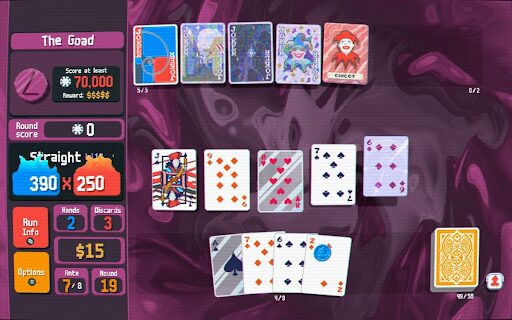
The presentation and gameplay are staggeringly simple. It is video poker, down to the bubbled-out CRT effect of the screen itself. You are endlessly in a quest to make the best poker hand possible, with each type of hand seeing a scalable number of chips and multipliers associated with it based on the regular rules of the game—Royal Flushes starting at 100 Chips and an 8 Mult, while a pair is 10 Chips and a 2 Mult. Each card is then also associated with a number of chips, again based on the 52-card deck, with aces worth 11 and twos worth 2. Your turn ends, and you multiply the number of chips with the multiplier while hoping you did the math correctly in your head. And while you begin with the standard deck, you can modify it throughout the run, adding in cards, destroying cards, and changing both their chip and modifier values—maybe a card becomes Wild to make it easier to get flushes, or you make one of the cards steel, which will give you a x1.5 Mult when that card is in your hand at the end of a turn.
Each level, or (staying in the theme of poker) Ante, unfolds around a Small Blind, a Big Blind, and then a Boss Blind, which increase the amount of chips needed to clear them, with the latter throwing some kind of modifier into the mix—perhaps Spades are debuffed this round, or you’re playing with one less card in your hand. You can choose to opt out of the Small or Big Blinds and instead pick a tag that’s been assigned to each, meaning you don’t play a poker hand and skip to the next Blind, instead seeing some kind of singular deck modification. But you also don’t get to go to the shop, where you can buy a wider array of said moderations, nor do you get the monetary rewards that come with winning that Blind. You keep building your deck up until all eight Antes are completed, going from scoring somewhere around 300 chips in the first Small Blind to sometimes as high as the millions in the final Boss Blind.
As I’m sure is obvious based on its name, BALATRO is largely built around Jokers. Jokers, like SLAY THE SPIRE’s relics or MONSTER TRAIN’s artifacts, are a way of passively developing your deck and strategy; when acquired, they sit in a separate hand to that of your standard deck, and their modifiers will likely determine whether or not you win the game and the way you build out the rest of the game. Some are based on hand type (the Jolly Joker for example gives you a +8 Mult if the played hand contains a Pair, so you’ll likely be building around scoring with pairs or full houses), others are temporary modifiers (Ice Cream gives you an additional 100 Chips per hand, but you lose five for every hand played), and some throw an advanced level of chaos into your game strategy (Madness gains x0.5 Mult every time you play the Small or Big Blinds, but destroys a random joker in the process). Different combinations of jokers complement each other nicely and, before you know it, scoring a million chips isn’t so daunting.
The resulting game is endlessly addicting. You can move through all eight Antes pretty quickly once you get the hang of the sometimes clunky menu interface (perhaps the game’s one obvious flaw currently, a layout that is difficult to navigate to get to the game types you want to play). The mindless repetition comes more quickly than others in the genre, but the speed of each round is itself a unique rush. Like any game with this many modifiers at your disposal, seeing how each one can fit together is worth dozens of hours of gameplay alone. Play long enough and hitting over one million points will happen naturally, but like watching someone who is hot at a roulette table, reading about or seeing mega hands happen is fascinatingly alluring—if you’re a fan, I dare you to not be captivated by streamer Skoottie landed a whopping 143 Billion-point hand back during the game’s demo days, high drama as entertaining as anything shown during the World Series of Poker on ESPN.
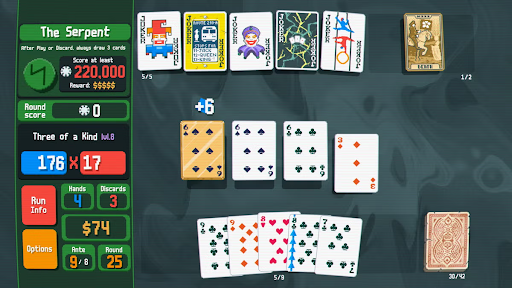
Like a degenerate, you can bask in the glow of the video poker screen for hours on end. Saying the quiet part out loud, what BALATRO makes plainly obvious that most other games in this genre obscure is how baldly roguelike deckbuilding is just gambling. We think about poker in terms of odds; for example, the percentage of a payout when you open with 21 in Blackjack ranges from as high as 93.56% to as low as 55.58% if the dealer is showing 11, and the probability of winning a nine-player game of Texas Hold ‘Em with pocket aces is 31.36%. Whether we think about video games in those specific terms, we’re likely doing similar math—it might not be as exact a number as 55.58%, but if you get a specific gun in a shooter or a specific power in an RPG, you will reconsider both your odds of success and the risk you can take therein. Roguelike games double down on that consideration and BALATRO is bending poker’s specific aesthetic and rules.
It’s enough to have you calling a help hotline. I had a pseudo allegory of the cave moment at some point playing BALATRO because its source material is so directly linked to a form of addiction—not so much that I myself was addicted despite how much I poke fun at that idea in this review, but rather considering the nature of video gaming as a form of legitimate gambling. This isn’t novel of course—Hell, I can look up player odds for the 2024 ROCKET LEAGUE Championship Series right now. But we often don’t think about gaming as gambling, we think about it as sport, a thin line these days but one I think many would draw. The players you can regularly bet on for FORTNITE or ROCKET LEAGUE tournaments aren’t gambling addicts, per se, these are athletes! The best in the world at playing this one game! For the first time playing BALATRO, I suddenly felt more like a guy down a couple hundred dollars at the Venetian than Michael Jordan.
Over the 4th of July I took a short, 24-hour trip to Vegas that, ironically, was breaking up an active, several-week binge of BALATRO. I’d sunk easily 120ish hours into the game by the time I set off for Sin City. And dear reader, I don’t mind telling you I found a way to lose $115 pretty quickly out in the Nevada heat. It was a sobering reminder of two things: 1. I’m a pretty mediocre video black jack player and 2. At the very least, playing video games will keep my bank account (moderately) safe. Now, if you don’t mind, it’s time for me to sign off and go lose a virtual $115 in BALATRO.


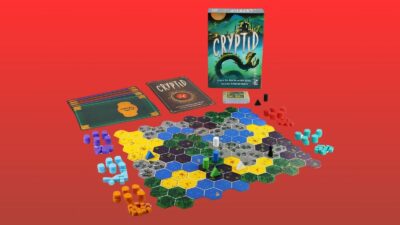
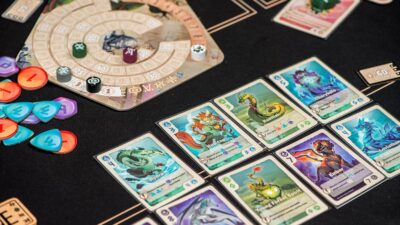
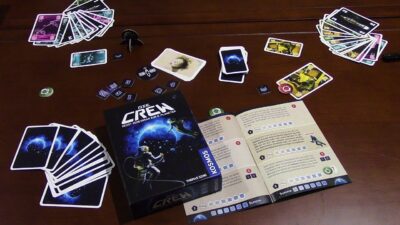
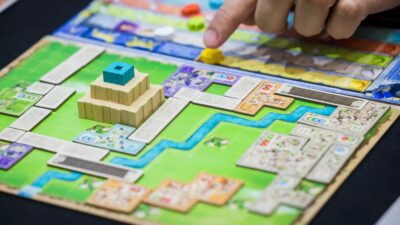

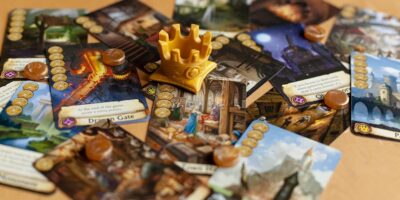


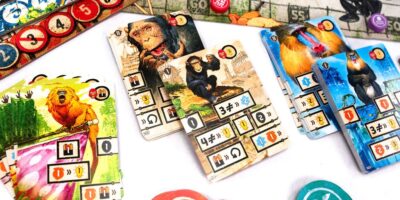
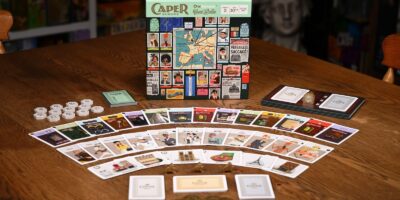




Comments